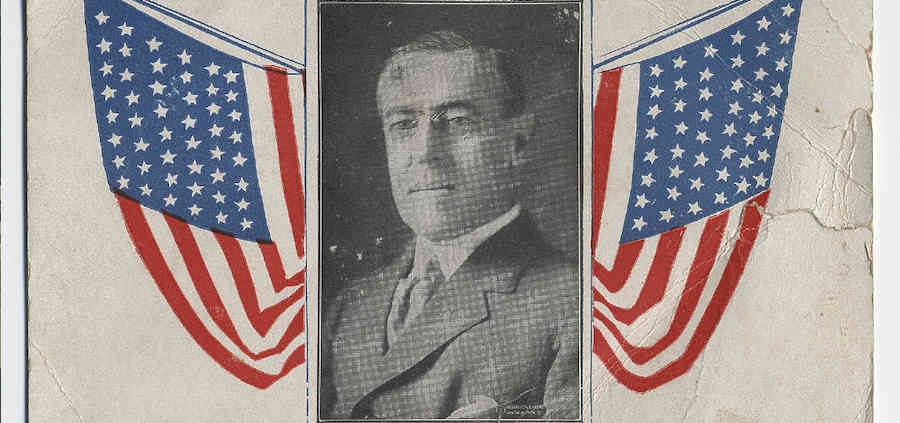Ben Salmon and Catholic Pacifism by Roger Karny
When the United States under Woodrow Wilson entered the First World War in 1917, Europe had already been massacring its young men on the battlefield for three years. Wilson had won reelection to the presidency in 1916 under the slogan “He Kept Us Out of War.”
Few men resisted the draft, including Catholics. Only a few radicals and socialists did, and they were persecuted and jailed for doing so. Ben Salmon, a fervent Catholic layman who opposed all wars, was one such resister. He was arrested and convicted of treason for his refusal to kill others.
According to an article in the December 2016 edition of the Catholic Worker, Salmon was initially sentenced to death, which was later reduced to 25 years in prison. He and other pacifists were vilified and subjected to humiliating and brutal treatment while incarcerated. Salmon went on a hunger strike to protest his inhumane treatment, but the government ordered force-feeding with tubes down his throat, the same treatment that many US suffragettes received when they staged a hunger strike after the war. In both of these cases, the government feared the bad publicity that would result from either the pacifists or the suffragettes dying of hunger.
The Catholic group the Knights of Columbus kicked Salmon out. Almost all Catholic bishops and prelates of the time supported sending our men to the European war. It’s uncanny, but the same thing happens now. The Catholic hierarchy almost always supports its government’s wars. Apparently, the Catholic Church values its temporal security over Christ’s commands to “love your neighbor” and “do not worry about tomorrow.”
Salmon believed that the idea of a “just” war went against the nonviolent teachings of Jesus. He declared that World War I had created 17,000 new millionaires (from war profiteering) while US soldiers received only $50 a month to sacrifice their lives in Europe. The government declared him insane and sent him to a psychiatric hospital in Washington, DC. The newly formed American Civil Liberties Union and a Catholic University professor, Father John Ryan, finally secured Salmon’s release toward the end of 1920.
Salmon was ostracized from his home town of Denver, Colorado, moved to Chicago to work, and died in 1932 at the young age of 43. His death was attributed to the ill treatment he had received in prison.
A son of Salmon’s became a priest and a daughter a nun. According to the Catholic Worker article, she is in her nineties and in retirement at Maryknoll on the Hudson. Some people are trying to petition the Archdiocese of Denver (Salmon’s home city that vilified him for his pacifist stance) to acknowledge his faith and witness.
Knowing the Archdiocese of Denver and the Denver-area Catholic newspaper that rubber-stamps it, I doubt this will occur. The archbishop and most of his associates are ultra-conservative and, as far as I know, gleefully supported George W. Bush, most Republicans, and Donald Trump in the last election. They reject killing by abortion, but don’t mind soldiers and civilians going to their deaths by the thousands in one of our endless wars.
In Fyodor Dostoevsky’s novel The Brothers Karamazov, Ivan Karamazov relates the tale of the Grand Inquisitor. It describes a meeting between the Grand Inquisitor of the Spanish Inquisition and a meek Christ who happens to appear to him one day. The cynical inquisitor mocks Christ and tears apart all his teachings in front of him, and then tells the Christ figure to go away and never return. The whole point of Ivan’s story is that the inquisitor and his cohort have usurped the freedom to think and act of their religious followers, and in return have “blessed” them with some measure of security.
Is this not the role of most organized religionists now? To usurp our freedom to be and to think and in return give us some pablum and a false sense of security? If not, why has the hierarchy of the Catholic Church almost always supported the status quo, siding with the landed and wealthy aristocracy and plutocracy? Witness the Mexican and Cuban Revolutions, the Spanish Civil War, and the many uprisings throughout Latin America and other developing nations. The church has almost always supported the reigning dictatorships against the will of the people—and then wonders why, in the few cases where the popular revolts succeed, that the new governments persecute the church and its prelates! The question the church needs to ask today is Dostoevsky’s: Which is more vital, more Christlike: freedom or false security?
Roger Karny is a freelance writer living in Colorado, and a graduate of Swarthmore College. He worked for 30 years for social services. His articles have also appeared in the Industrial Worker.





Leave a Reply
Want to join the discussion?Feel free to contribute!